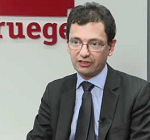The financial crisis in Europe has led to increasing social unrest, especially in southern European countries which frequently protest against austerity measures and rising rates of unemployment. Gateway House’s Alisha Pinto interviews Nicolas Véron, a senior fellow at Brugel, a Brussels-based think tank, to discuss the future of the political and banking union in Europe and the potential for a deeper Indo-EU relationship.
Q: Perhaps most challenging for Europe is the formation of a political union. Even if the European Parliament is given greater decision-making powers, will there be an accountability mechanism for Europe as a whole or one only for the Eurozone?
Presently, there exists no mechanism to hold the European Council, or any group of European leaders, accountable as a body. Even though its members are elected individually, the collective executive must be held accountable.
The first step Europe must take is to establish a legislative body with proper and equal representation of the European citizenry. The present European Parliament does not have equal representation of citizens; a new treaty would be required to enforce such a principle.
The next question to address is the framework of the executive and the accountability vis-à-vis a body with equal representation of European citizens. These are complex questions and any progress on them will take time.
Q: You have in the past commented on the need to create a coherent European banking union, including a Europe-wide deposit insurance system. How do you see this happening when nearly half of the EU’s GDP comes from non-Eurozone member states?
The banking union is a project connected with the monetary union and has been triggered now because of the problems with the latter. The members of the banking union need not be exactly the same as those of the monetary union. More specifically, some countries outside the Eurozone (such as Poland or Denmark) may join the banking union, perhaps only at a later stage or only for some components.
Deposit Insurance has a strong link with fiscal policy so it remains to be seen how the arrangements will be engineered. According to the current sequence of the banking union project, the creation of a supervisory framework will take precedence over a deposit insurance system.
Q: Unemployment in the Eurozone countries has risen to 11.6%, and productivity and growth are both slowing. How has this impacted the region? And do you see European countries reviewing the model they currently follow?
The deterioration of growth prospects is at the core of the crisis, particularly in southern Europe. It is the most urgent issue confronting Europe. The solution lies partly in structural reform and a change in the economic model in the Eurozone countries. However, in my view, all four dimensions are crucial: banking, fiscal, structural and politico-institutional. It is impossible to reduce the crisis to only one of those four dimensions.
As Mario Monti, the Italian Prime Minister, mentioned earlier, even if domestic economic issues in a particular country in Europe are addressed, it won’t resolve the overall economic situation. Actions need to be taken at the Eurozone level just as much as they do in the domestic realm.
Q: Is there anything India can learn from these issues in Europe, particularly the unemployment in Greece or Spain, and its implications for labour mobility within the economy?
It is at least as much the other way round: Europe has lessons to learn from India. There is a lot of labour mobility within India. When conditions are not the best in one state, people migrate to another. From an economic perspective, this is significant, and though sometimes painful, it is part of a healthy adjustment process for the Indian economy. We need more labour mobility in Europe. It is difficult for many Europeans to adjust to this reality because they like to stay where they are. It will be a harsh but important lesson.
Q: How do you see the India-EU relationship evolving?
Europeans would like to see some of the investment restrictions in India lifted, to make way for more companies and investments from Europe. India is perceived as a complicated country, but one which has tremendous development potential.
In a larger context, however, India provides some lessons on diversity for Europe: Europeans have begun to think that Europe is too diverse to hold together. Here, India provides a wonderful example of a continent-sized country with enormous diversity, and which works rather well as a democracy. From this perspective, it can be an inspiration for Europe.
Nicolas Véron, a French economist, is a Senior Fellow at Bruegel, a Brussels-based think tank and a Visiting Fellow at the Peterson Institute for International Economics in Washington DC.


